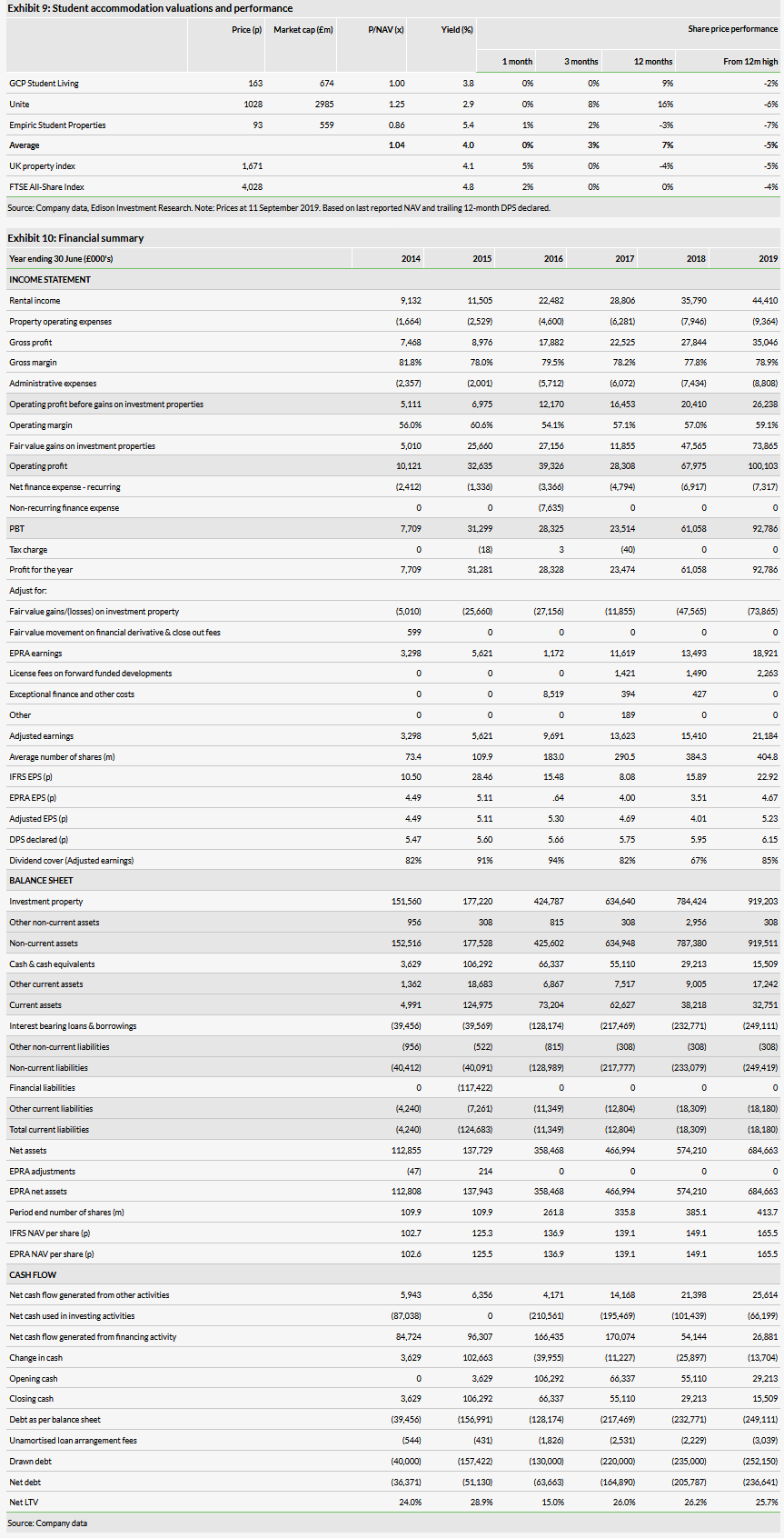GCP Student Living PLC (LON:DIGS) is continuing to benefit from strong supply-demand fundamentals in the markets in which it operates, primarily in and around London. It is maintaining full occupancy, rents continue to grow ahead of inflation and profitability is showing the benefits of scale. Dividends are growing and cover building as new assets come on stream, and DIGS is well on track for full cover on a fully developed and let basis. Investor sentiment towards the sector is positive and the new London Plan appears to be adding to the scarcity value of DIGS’s London assets.
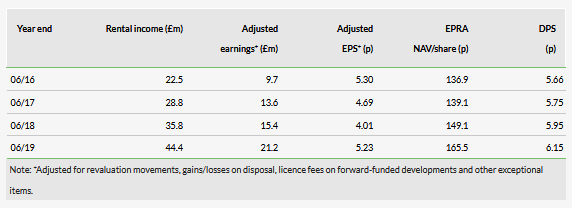
Strong student and investor demand in London
Positively for DIGS, with 87% of its assets in and around London, international student applications continue to grow (+8.9% for 2019/20) and despite Brexit, EU applications also show slight growth. Government plans to boost international student numbers and income are also positive. The operational assets are again fully occupied for 2019/20, with like-for-like rental growth of 4.4% (2018/19: 3.5%). In the investment market, recent transactions indicate continuing strong investor interest in London assets in particular and the new London Plan seems likely to further reduce the supply of new London assets and increase the scarcity value of existing assets.
15.4% NAV total return in FY19
As DIGS had previously reported, EPRA NAV per share increased by 11% to 165.5p in FY19 and, including reinvestment of dividends paid, the NAV total return was 15.4%. Based on the share price, shareholder total return was 14.8% and the annualised return since IPO is now 12.9%. Rental income growth of 24% included a nine-month contribution from Scape Bloomsbury, above inflation rental growth, and continued full occupancy. The operating margin increased to c 59% from c 57% and adjusted EPS grew c 30% to 5.23p. DPS declared increased 3.4% to 6.15p and was 85% covered by adjusted earnings. Property valuations were lifted by rental growth, operational progress, full occupancy and a further tightening of market yields. The current year will benefit from a full contribution from Scape Bloomsbury and a first-time contribution from Circus Street, Brighton.
Positive fundamentals support growth and returns
Growing dividends are supported by continuing strong fundamentals in DIGS’s chosen markets and should be covered by adjusted earnings on a fully operational basis. The shares trade at a small discount to NAV, despite share price and NAV returns since the IPO continuing to be well above the 8–10% target, and good potential for further income and capital growth.
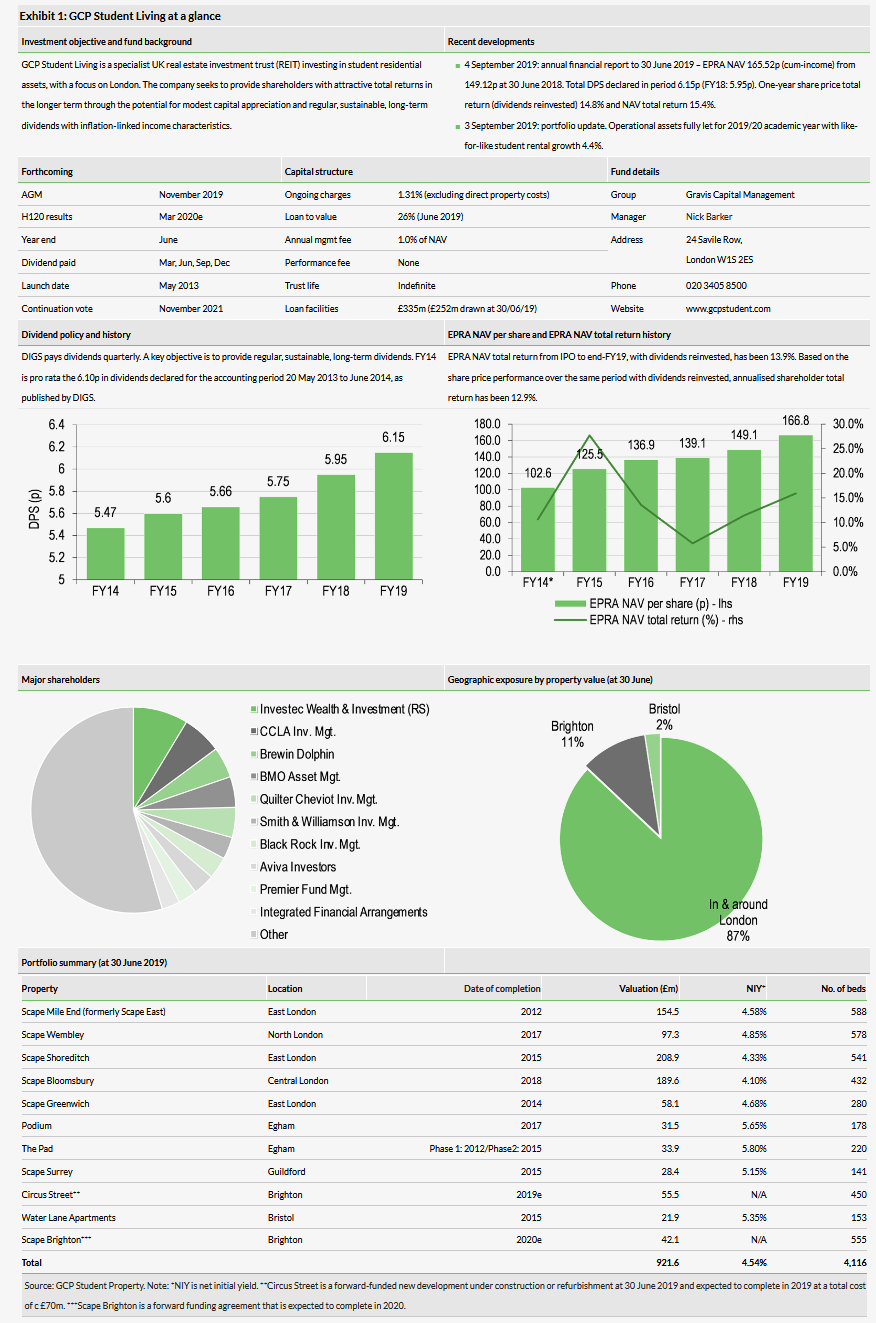
London-focused student accommodation
DIGS is a specialist UK REIT investing in student residential assets and differentiated by a focus on assets in and around London, 87% by value at 30 June 2019 (FY19). The shares have been listed since May 2013 and the company has a premium listing on the FCA’s Official List, trading on the Premium segment of the Main Market of the London Stock Exchange. The investment objective is to provide shareholders with attractive total returns in the longer term through regular, sustainable dividends with inflation-linked characteristics and the potential for modest capital appreciation. DPS has increased steadily since IPO and the annualised EPRA NAV total return from IPO to end-FY19, with dividends reinvested, has been 13.9% (15.4% in FY19). Based on the share price performance over the same period with dividends reinvested, the annualised shareholder total return has been 12.9% (14.8% in FY19).
The student housing sector continues to attract investor interest for its favourable risk-adjusted yields, good levels of rental growth and less exposure to the economic-led cycles that affect traditional commercial property sectors such as offices, industrial and retail property. DIGS is differentiated by a focus on properties that are located primarily in or around London and invests in other markets with similar supply-demand characteristics (eg Brighton), where growing student numbers significantly outstrip the supply of student accommodation. London continues to see increasing numbers of international and post-graduate students, driving demand for purpose-built student accommodation (PBSA), while planning restrictions and competing demands limit supply. The investment manager targets high-specification, modern, purpose-built accommodation with proximity to a suitable higher education institution and/or a major transport hub. Such properties may be more likely to both appeal to students today and offer longevity of income potential to support long-term value creation, even if the current yields may be lower.
At end-FY19, the portfolio comprised the 11 assets shown at the bottom of Exhibit 1, providing c 4,100 beds, of which c 3,500 will be operational and fully let for the 2019/20 academic year. The portfolio was externally valued at £921.6m (before lease incentive adjustments), reflecting a net initial yield (NIY) of 4.54%.
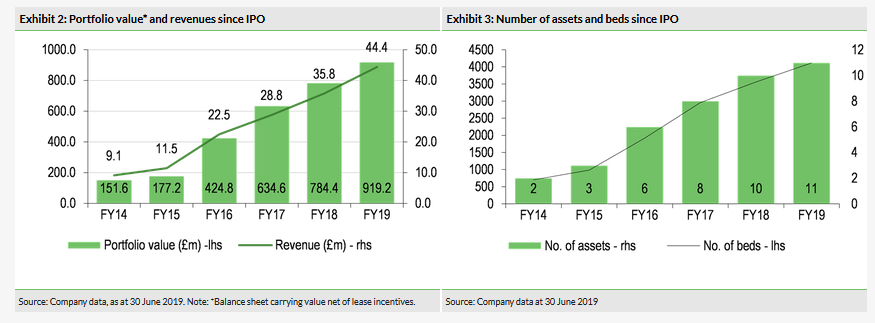
Management and governance
Fully independent board
DIGS has a fully independent non-executive board that is responsible for the effective stewardship of the company’s affairs, including corporate strategy, corporate governance, risk assessment and overall investment policy. DIGS has been chaired since IPO by Robert Peto, who has extensive corporate, property sector and board experience. He will retire from the board at the AGM to be held late in 2020 and will be replaced by David Hunter, who joined the board in May 2019. David Hunter is a qualified chartered surveyor and a professional strategic adviser focused principally on UK and international real estate. He is on the board of listed and unlisted companies in the UK and overseas, including as chairman of Custodian REIT and ICG-Longbow (the real estate division of Intermediate Capital Group), senior independent director of Yatra Capital, a director of Saffron India Real Estate Fund and is an adviser to French family office, Quilvest.
The other four independent non-executive directors and their dates of appointment are Malcolm Naish (2013, IPO), Marlene Wood (March 2015) and Gillian Day (February 2018). Full board biographies may be found on the company’s website.
DIGS has an unlimited life, although the company’s articles require regular continuation votes to be put to shareholders. The first vote was held in November 2018 and, given DIGS’s outperformance of the return targets that were set at IPO and the continuing strong fundamentals of the markets in which it operates, shareholders overwhelmingly supported continuation. Future votes are at three-yearly intervals, with the next to be held at the AGM in 2021.
Investment manager – Gravis
DIGS has appointed Gravis to provide day-to-day investment management services. Gravis was established in 2008 and is privately owned by its directors and founding members. At 30 June 2019 it was managing £2.7bn in assets, including two other listed closed-end vehicles. Nick Barker from Gravis is the fund manager with day-to-day responsibility for the provision of investment advice to DIGS. He is a qualified surveyor who joined Gravis in 2015 after eight years with Schroder Real Estate Management, where he was head of alternatives for the real estate business and a member of the fund management team. Investment management fees are accrued daily and paid quarterly in arrears at 1% of NAV from which Gravis is responsible for the asset management fees of 0.25% of NAV.
Asset and facilities management – predominantly Scape
Scape Student Living (Scape) is the principal asset and facilities manager for DIGS, in respect of all the Scape-branded assets as well as The Pad and Podium. Collegiate provides asset and facilities management for the Water Lane Apartments in Bristol. As a developer and manager, Scape has extensive expertise in the construction, design and operation of student accommodation and its branding proposition is to provide high-quality but affordable student accommodation with a modern design. The first Scape building was launched in London’s Mile End in 2012 and today it designs, builds and operates buildings for students across the globe, with 18,000 beds in operation or under development. Scape manages the DIGS facilities while the actual asset management costs (such as on-site staff, utilities, etc) are paid directly by DIGS, a structure that is both operationally and tax-efficient, avoiding additional non-deductible VAT expenses that may otherwise arise. The Scape fees (0.25% of NAV pa) are paid by Gravis out of its (1%) fee entitlement. DIGS has benefitted from the close relationship between Scape and Gravis, whose owners have a 50% interest in Scape, through preferential access to pipeline assets.
FY19: Strong income growth and increased DPS cover
The portfolio continued to perform well in FY19, benefiting from the supply-demand imbalances for high-quality, modern student facilities in those locations targeted by the company. The assets under development are on track to deliver further income growth and the company continues to identify attractive opportunities for further investment.
Rental income grew strongly (24.1%), benefiting from new assets becoming operational, above inflation rental growth and continued full occupancy. Profitability is also showing the benefit of scale economies, with adjusted earnings and adjusted EPS up 37.5% and 30.5% respectively. Increased dividends (up 3.4% in the year) have been set and investment decisions made based on the investment manager’s expectation that they will be covered by earnings on a fully developed and let basis. With dividends covered 85% by adjusted earnings (we estimate cover of 89% in H219), the company is well on track to achieving this. EPRA (and IFRS) NAV per share increased by 11.0% during the year to 165.52p. Including the reinvestment of dividends paid during the period, the NAV total return was 15.4%.
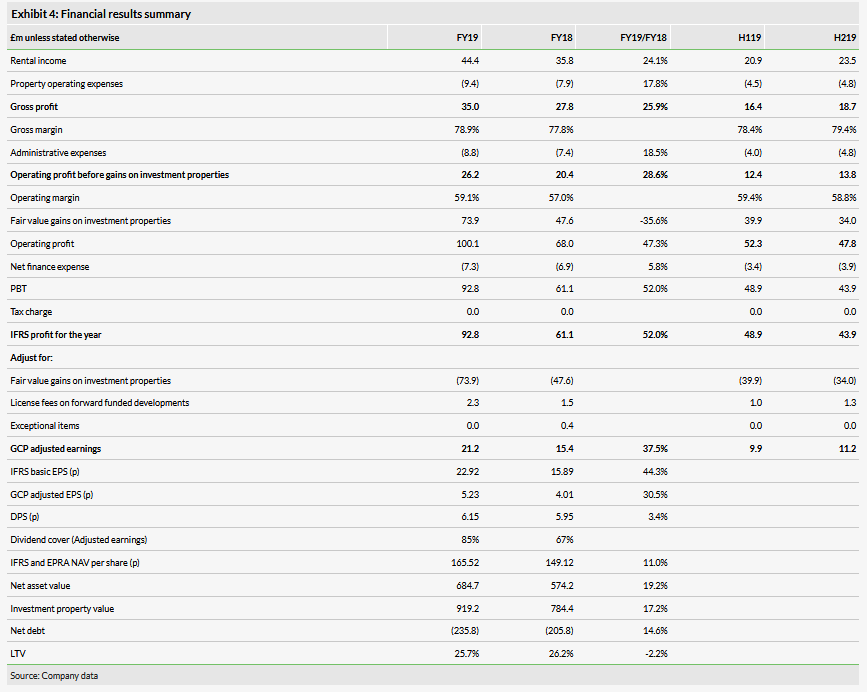
The key financial highlights from the FY19 results were:
Investment strategy and portfolio update
The company’s property portfolio consists of high-quality, modern, purpose-built accommodation primarily in and around London (Exhibit 1). Some of the assets include a relatively small amount of complementary commercial space, contributing c 6% of the FY19 gross rental income. In London, a shortage of suitable accommodation, tight constraints on new supply and growing demand, particularly from overseas students, is a supportive backdrop to occupancy and rent levels, providing visibility over income. These same supply constraints can also present a challenge to asset growth, but the relationship with Scape has been particularly effective in helping DIGS access attractive properties that meet its investment criteria and steadily grow its portfolio. The London Plan, expected to be introduced later this year, is likely to create new barriers to the development of such properties and increase the investment attraction of existing assets.
Most of DIGS’ student accommodation is directly let to students from a broad range of nationalities (124) attending a diverse group of higher education institutions (80). Reflecting the London focus of the portfolio and the popularity of London with international students, 63% of rooms are let to non-EU international students, 14% to EU students and 23% to UK students. Of these, 70% are undergraduates and 30% are postgraduates.
Scape Bloomsbury delivered ahead of schedule
Scape Bloomsbury, providing 432 beds in the heart of central London, was completed ahead of schedule, in time for the 2018/19 academic year. DIGS had initially expected to open the first five floors in September and the top three in December but was able to fully open in September with higher than budgeted overall initial occupancy. Annualised rental income is c £9m and Scape Bloomsbury contributed for around nine months in FY19, with a further income uplift to come through in FY20 from a full-year contribution and a step up to full occupancy. The planning consent for Scape Bloomsbury permits occupation by non-students outside of the academic year that, given its prime location, is likely to prove a useful additional source of revenue. It was valued at £189.6m at end-FY19, reflecting a net initial yield of 4.10%, and contributed significantly (£18.7m) to the FY19 property revaluation surplus.
Brighton forward-funding assets on track
In May 2019, DIGS acquired Scape Brighton, its second asset in Brighton, having entered into a conditional contract to acquire and forward fund the asset in July 2018. Like London, Brighton is a difficult market in which to acquire direct-let, purpose-built student accommodation owing to tight land supply and strict planning constraints. Scape Brighton is situated on the University of Brighton’s main campus and on completion, expected in time for the 2020/21 academic year, will provide 555 beds and extensive communal areas, with c 1,500sqft of retail space. The planning consent allows for the property to be available to accommodate students from any of Brighton’s higher education institutions in addition to any language school students during the summer period. During the construction phase, DIGS will benefit from licensing fees in respect of the development funding extended, providing a 5.5% coupon pa and included in adjusted earnings.
Construction work on the c 450-bed, forward-funded office project at Circus Street in central Brighton is proceeding in line with expectations and nearing completion in time for the 2019/20 academic year. Unlike most of DIGS assets, Circus Street is let on a 21-year, RPI-linked lease to Kaplan at an initial rent of £2.9m. The development includes a standalone, speculatively developed Grade A office building, which is generating strong interest from potential occupiers and investors given a tight Brighton market. It will be retained or sold and the capital recycled when completed and stabilised, depending on the nature of the tenant. During the construction phase, licencing fee income, at a rate of 5.5% pa of the funding extended, has been recognised in adjusted income.
Further growth in the pipeline
DIGS also benefits from a future contractual arrangement to acquire Scape Canalside, a 412-bed, new-build asset located adjacent to Queen Mary University of London, a strong Russell Group higher-education institution, and is considering the optimum way to finance its acquisition. The asset is a high-specification, purpose-built private student accommodation residence, the design of which and its market positioning are complementary to the existing 588-bed Scape Mile End (formerly Scape East) that is in the same locality. Scape Canalside achieved practical completion in July 2019 and has been fully let for the 2019/20 academic year. Through its investment manager, DIGS has secured attractive pricing through the forward purchase agreement, which the company expects will result in an uplift in the valuation post purchase, expected to coincide with the start of the academic year. The actual acquisition price will be determined by independent valuation, but the company has said this is likely to be in excess of £90m.
Additionally, the company has entered into a conditional forward-purchase agreement to acquire a well-situated, high-specification, purpose-built asset with 403 beds in the same locality as its 141-bed Scape Guildford asset. Guildford is home to the University of Surrey (a UK top 20 university), the University of Law and the Academy of Contemporary Music, contributing to an undersupply of private student residential accommodation and full occupation at Scape Surrey in each year since its acquisition in 2015. DIGS has provided no financial details at this stage. The property is expected to complete in time for the 2020/21 academic year.
Continuing above-inflation rental growth
In terms of income returns, DIGS targets regular sustainable dividends with inflation-linked characteristics. A relatively small proportion of rental income is contractually directly linked to RPI (Circus Street at completion will be an exception), so the inflation-linked characteristic relies on the selection of suitable assets and locations with favourable demand-supply dynamics that have the potential to deliver continuing rental growth. Exhibit 5 shows that DIGS has been able to sustain rental growth in excess of both RPI and the market over several years, achieving average like-for-like rental growth of 3.5% in the academic year beginning in 2018 (and reflected in the FY19 results) and 4.4% for the academic year commencing in 2019 (to impact on FY20).

Funding in place, with increased flexibility
At the end of FY19, DIGS had available debt facilities of £335m, of which £252.1m had been drawn. Allowing for the £15.5m cash balance, net debt was £235.8m and the loan to value ratio (LTV) was 25.7%. The blended average cost of the drawn debt was 2.94%, with an average weighted maturity of c seven years.
The debt facilities comprise £235m of fixed-rate borrowing at an average 2.96% and £100m of more flexible floating rate debt.
Towards funding the continuing growth of the portfolio, in FY19 the company raised gross proceeds of £43.1m by way of two non-pre-emptive placings of new ordinary shares and secured additional debt facilities amounting to £100m. The new debt facilities, with Wells Fargo (NYSE:WFC), comprise a three-year re-drawable credit facility of up to £45m at a margin of 1.85% above three-month Libor and a development facility of up to £55m at a 3.1% margin over three-month Libor during the construction phase, falling to 2.0% over Libor once the asset has been completed and stabilised.
The re-drawable credit facility provides more flexible debt finance than fixed long-term debt and will be available for use in funding the completion of Circus Street, Brighton, and initial construction costs at Scape Brighton, as well as general corporate purposes. The development facility will be drawn over time and is intended to part-fund the construction of Scape Brighton. Once Scape Brighton is completed and stabilised, the development loan will be refinanced, allowing it to be repaid by the due date (December 2021 with a conditional option to extend for a further 12 months).
DIGS’s immediate investment plans at end-FY19 include the remaining forward funding commitments to Circus Street and to Scape Brighton, and the expected purchase of Scape Canalside under the forward purchase agreement. DIGS has indicated that if the acquisition of Scape Canalside were to be funded entirely with new borrowings, the LTV would increase to a c mid-30s percentage as the forward-funded assets complete over the next 12–18 months.
No decision has yet been made as to whether to proceed with the conditional forward-purchase agreement in respect of the Guildford asset.
Positive market developments
The London difference
The demand for full-time higher education and the supply of purpose-built accommodation is not evenly distributed across the UK. From a student demand-supply perspective, the differentiating features of the London market, where 87% of DIGS’s assets are located, can be summarised as:
Brighton shares similar market dynamics to London. It is home to the University of Sussex (a UK top 20 university) and the University of Brighton, with an aggregate c 32,000 students including c 8,000 international students. The city is also home to two of the largest English language foundation course providers in the UK.
International student numbers continue to increase
Data from the Universities and Colleges Admissions Service (UCAS) show that at the 30 June 2019 application deadline for the 2019/20 academic year, international (excluding EU) student applications were ahead by 8.9% compared with 2018/19, with Chinese applications particularly strong (+30%). This is a very positive development for DIGS, for which international students currently account for 63% of the total. In addition to the strength of demand, international students are often less price sensitive than domestic students when it comes to choosing suitable accommodation. EU applications (14.0% of the total for DIGS) were also up, but by a smaller 1.1%. Helping to counter Brexit uncertainties, EU students who entered in the previous 2018/19 academic year were guaranteed the same fee rates as UK students, as well as access to student finance for the duration of their courses. Including UK applications (down 1.1%), total applications were up by 0.2% to 638k. The decline in UK-domiciled applicants seems largely driven by demographics, although the long-term decline in the number of UK 18- to 20-year-olds should begin to reverse from 2020, while the desire to go to university, measured by participation rates, has continued to increase. Applications by UK students continue to significantly outstrip place/acceptances by a margin of c 30%.
Government encouraging further international growth
In March 2019, the UK Department for Education and International Trade published a plan to increase international student numbers by more than 30% and their income contribution to the economy from an estimated c £20bn currently to £35bn by 2030. There is no limit on the number of international students that can study in the UK and among the measures being suggested to achieve the new targets are proposals to extend the post-study period during which students may remain in the UK and potential measures to support them into UK employment.
Augar proposals are positive
In May 2019 the report of the Augar Review of higher education suggested a reduction in tuition fees from the current £9,250 pa to £7,500 and an extension of student repayment periods from 30 to 40 years. The report also suggested a return of maintenance grants to assist poorer students. It is unclear whether and to what extent the proposals will be adopted by the government but, should this be the case, enactment should have a positive impact on UK student applications.
Migration towards top-performing universities
Since the UK government raised tuition fees to a maximum of £9,000 pa in 2012 (and subsequently increased to £9,250), which was followed by a removal of the cap on undergraduate student numbers in 2015, there is clear evidence that many students are influenced in their choice of university by its cost and the expected future benefit. This has enabled the top universities to grow in size while maintaining their academic requirements. Given its concentration of top universities (home to six of the top 40), London has benefited.
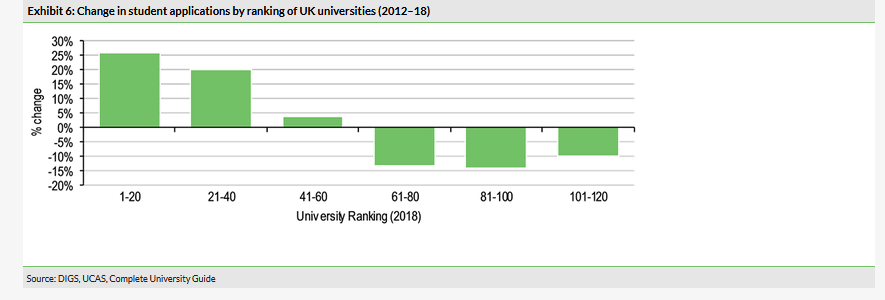
The London Plan
The London Plan, prepared by the Mayor of London, is expected to be introduced later this year. It has been reported that it will require new student developments to be in partnership with higher education institutions and let under nomination agreements with them. The plan is also expected to require the provision of affordable student accommodation within each new scheme. It seems likely that such measures will negatively affect new private schemes by increasing complexity and diminishing the expected returns, adding further to supply constraints. This is likely to increase the scarcity value of DIGS’s existing and pipeline London assets, but it will also make further London growth more difficult, underling the value of the relationship with Scape.
London investment transactions supporting yields
Investor sentiment towards the asset class remains positive and this is reflected in £3.9bn of student assets having been traded or being under offer so far in 2019. This compares with £3.2bn of investment in the whole of 2018. The favourable supply-demand environment and anticipation of the impact of the new London Plan can be seen in transactions relating to London assets and the continuing compression in London yields, also reflected in the DIGS portfolio.
We have previously commented on the August 2018 acquisition of a £350m stake in the £1.1bn, 5,100-bed Chapter portfolio, alongside existing investor Greystar Real Estate Partners, by Allianz (DE:ALVG) and PSP Investments. Gravis estimates the transaction to have been at an NIY of c 4.0%. In March 2019, the same group of investors, through the Chapter portfolio, agreed to acquire an additional prime London student housing asset from Apache (NYSE:APA) Capital. The transaction values the 458-bed Paul St East, EC2, purpose-built student accommodation block in Shoreditch at more than £160m, which Gravis estimates reflects an NIY of 3.75%, which is tighter than the NIY for Scape Shoreditch of 4.15% for the student accommodation and 4.33% overall (including the commercial space).
Also in March, Watkin Jones completed the £90m forward funding and sale of Kelaty House, a 599-bed student development in Wembley, to the real estate investment business of DWS, the investment management arm of Deutsche Bank (DE:DBKGn) of Germany and a new entrant into the UK student accommodation market. Gravis estimates that the 4.90% agreed forward-funding yield on the asset is consistent with a stabilised investment yield of c 4.5%. Although Kelaty House and Scape Wembley are comparable in terms of size, the stabilised yield for Scape Wembley is 4.85% despite it benefiting from closer proximity to underground transport links. In August 2019, DWS followed up its Wembley investment by acquiring the regional Vita portfolio of c 3,200 beds for £600m at a yield estimated by Gravis to be c 5.30%.
Valuation and performance
Performance continues to outpace 8–10% return target
The 8–10% long-term return target that DIGS set at IPO reflects the anticipation of continued rental growth to drive income earnings and dividends, with a corresponding positive impact on capital values, assuming broadly stable yields and a positive impact from modest gearing. Returns since IPO have been well ahead of this target and the trend continued in FY19.
In the period from IPO (20 May 2013) to the last published quarterly NAV at 30 June 2019 (end-FY19), DIGS has generated an EPRA NAV total return (dividends reinvested) of 121.5% on the opening NAV per share (after issue costs) of 97p, or an annualised compound return of 13.9%. Over the same period, the share price total return (dividends reinvested) was an aggregate 109.8% on the IPO price of 100p, or an annualised compound return of 12.9%. The closing share price at 30 June 2019 was 162.2p.

The DIGS returns are ahead of the broad UK commercial property sector, the FTSE All-Share Index and UK gilt returns over one, three and five years and since inception. The outperformance of DIGS compared with the broad UK commercial property sector has accelerated in recent months as the latter has been negatively affected by stresses in the retail subsector and more general economic uncertainty.
P/NAV below historical average
Recent strong growth in DIGS’s NAV has outpaced the increase in the share price, which trades at a small c 1.5% discount to EPRA NAV. This compares with an average premium of c 2.5% since IPO and a peak premium of 12.1%.
Given that student accommodation as an asset class benefits from a more stable yield, with lower volatility than mainstream commercial property, the small discount to NAV appears attractive. Positive fundamentals in DIGS’s target markets point to further rental growth. Combined with the completion and letting of assets under development, this should support future income growth and capital values, particularly given the continuing strong investor-led interest in PBSA assets, especially in London.
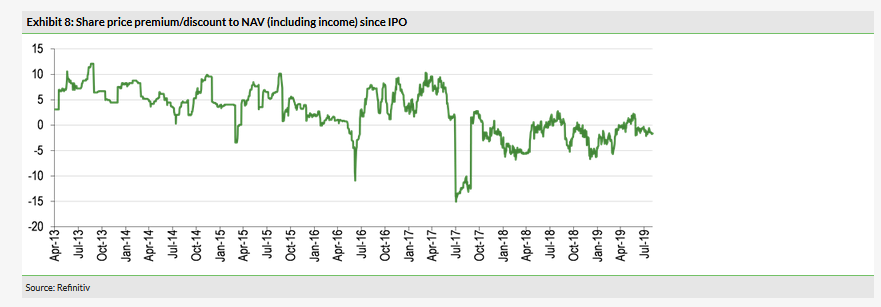
In Exhibit 9, we show a summary valuation and share price performance comparison for the three UK-listed student accommodation companies, DIGS, Unite and Empiric. DIGS offers a higher dividend yield compared with Unite and trades at a lower P/NAV. Empiric has a higher yield but as it continues to reposition itself from internally driven trading problems in 2017, the prospects for dividend growth are modest. DIGS and Unite have both clearly outperformed the broad UK property sector and the FTSE All-Share Index over the past year.
In the near term, the continuing strong fundamentals in DIGS’s target areas of the market and the further benefit to earnings, cash flow and dividend cover from the completion of assets under development are positive indicators for DIGS’s performance. Perhaps even more important is DIGS’s focus on larger and more efficient, well-designed and purpose-built assets, in good locations in supply-constrained markets, which provide comfort that the portfolio will be capable of sustaining performance over the long term.
